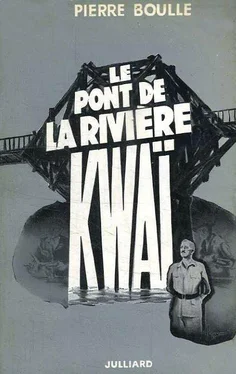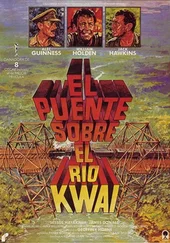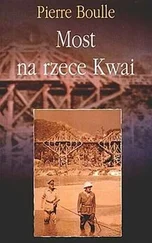This was the last desperate card in his hand. Even in the eyes of the Japanese authorities, Saito would not be able to justify such an unwarranted execution. He could not afford to leave any British witness alive. Following this argument to its logical conclusion, he would either have to massacre everyone on the sick list, including the Medical Officer, or else abandon all thought of revenge.
Clipton felt he had scored a temporary victory. Saito appeared to give the matter a great deal of thought. He was choking with rage and the shame of defeat, but he did not order his men to fire.
In fact, he gave no order at all. The men remained where they were, with their machine guns trained on the squad. They remained like that for a long time, a very long time indeed; for Saito refused to “lose face” by dismissing them. They remained there for most of the morning, without daring to move, until the parade ground was completely deserted.
It was hardly a decisive victory, and Clipton could not bear to think of what lay in store for the recalcitrants. But there was some consolation in the thought that he saved them from their immediate fate. The officers were marched off to the prison camp under escort. Colonel Nicholson was dragged away by a couple of gigantic Koreans, who were part of Saito’s personal bodyguard. He was taken into the Japanese colonel’s office, a small room which opened onto his sleeping quarters, thus enabling him to pay frequent visits to his store of drink next door. Saito slowly followed his prisoner inside and carefully closed the door behind him. Shortly afterward, Clipton, who was a sensitive man at heart, shuddered as he heard the sound of blows.
After half an hour’s beating-up, the Colonel was thrown into a hut where there was neither bed nor chair, so that he was forced to lie down in the damp mud on the floor when he felt too tired to stand up. For food he was given a bowl of rice heavily laced with salt, and Saito warned him that he would keep him there until he decided to obey orders.
For a week the only person he saw was a Korean sentry, a brute who looked like a gorilla, who on his own initiative added still more salt to the daily rice ration. But he forced himself to swallow a few mouthfuls of it and, after gulping down the whole of his meager ration of water, he would then lie down on the floor and try to disregard his hardships. He was forbidden to leave the cell, which consequently became as offensive as a cesspool.
At the end of a week Clipton was at last given permission to visit him. Shortly before, the M.O. had been summoned by Saito, whom he found wearing the sullen expression of an anxious tyrant. He could see that Saito was wavering between anger and fear, which he did his best to mask behind a cool tone of voice.
“I’m not responsible for all this,” he said. “The bridge across the river must be built, and a Japanese officer can’t afford to put up with heroics. Try and make him understand that I don’t intend to give in. Tell him that, thanks to him, all his officers are having the same treatment. If that’s not enough, his men will have to bear the consequences of his pigheadedness as well. So far, I haven’t interfered with you, or with those on the sick list. I’ve been kind enough to let them off all duties. I shall regard this kindness as a sign of weakness unless he changes his mind.”
He dismissed him with this threat, and Clipton was taken in to see the prisoner. He was at first horrified by the condition to which the C.O. had been reduced and by the physical deterioration which his body had undergone in such a short time. The sound of his voice, which was barely audible, seemed to be a distant, muffled echo of the tone of authority which the M.O. remembered. But this metamorphosis was only superficial. Colonel Nicholson’s spirit had not changed at all; and the words he uttered were still the same, although delivered in a different tone. Clipton, who had fully intended to persuade him to give in, now saw there was no chance of that. He soon exhausted all his carefully prepared arguments, and then fell silent. The Colonel did not even answer him, but simply said:
“Please let the others know that I’m still quite adamant. On no account will I have an officer from my battalion working like a navy.”
Clipton left the cell, torn once again between admiration and anger, a prey to painful indecision, unable to make up his mind whether he should worship the C.O. as a hero or regard him as a complete fool. He wondered whether it would not be best to ask God to crown this dangerous lunatic with a martyr’s halo and admit him into His kingdom as quickly as possible, so as to prevent him from turning the River Kwai camp into a scene of frightful tragedy. What Saito had said was no more than the truth. The treatment being meted out to the other officers was only one degree less inhuman, while the men were made regular targets for the brutality of the guards. As he walked away, Clipton thought of the danger that threatened his patients.
Saito must have been waiting for him, for he rushed up, his eyes betraying genuine anxiety as he inquired:
“Well?”
He was quite sober, and looked rather depressed. Clip- ton tried to judge how far the Colonel’s attitude was likely to make the Jap “lose face,” then pulled himself together and decided to take a firm line.
“Well, it’s like this. Colonel Nicholson won’t give in to force; nor will his officers. And in view of the way he’s being treated, I could not advise him to do so.”
He protested against the conditions of the prisoners in detention, quoting the Hague Convention as the Colonel had done, arguing from his professional point of view as a doctor, and finally from the simple humanitarian point of view, even going so far as to declare that such monstrous treatment was tantamount to murder. He expected a violent reaction, but none came. Saito merely muttered that the Colonel was to blame for the whole business, and then abruptly walked off. At that moment Clipton felt inclined to believe that he was really not such a bad man at heart, and that his actions were all due to fear of one kind or another: fear of his superiors, who were probably badgering him about the bridge, and fear of his subordinates, in whose eyes he was “losing face” through his obvious inability to exact obedience.
His natural inclination to generalize led Clipton to identify this combination of two fears, the fear of superiors and of subordinates respectively, as the main source of all calamities. As he put this idea into words, he felt that somewhere or other he had once come across this very psychological maxim. This gave him a certain sense of satisfaction, which helped to allay his anxiety. He developed this train of thought a little further, but was brought to a stop on the threshold of the hospital by the realization that every other calamity, even the worst in the world, could be attributed to men who had neither superiors nor subordinates.
Saito must have thought the matter over. His treatment of the prisoner was more lenient during the following week, at the end of which he went to see him and asked if he had finally decided to behave like a gentleman. He had arrived in a reasonable frame of mind, intending to appeal to the Colonel’s common sense, but faced with the latter’s refusal to discuss a question which was already cut and dried, he again lost his temper and worked himself up into a state of hysterical frenzy in which he could hardly be taken for a civilized human being. The Colonel was again beaten up, and the gorilla-like Korean received strict orders for the harsh regime of the first few days to be resumed. Saito even struck the guard as well. He was no longer responsible for his actions when seized by these fits, and he accused the man of being too soft-hearted. He rushed about the cell like a raving lunatic, brandishing a pistol and threatening to use it on the guard as well as the prisoner in order to enforce a little discipline.
Читать дальше











